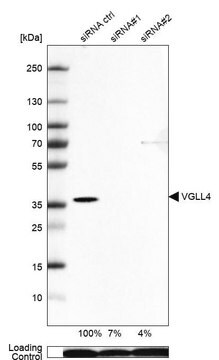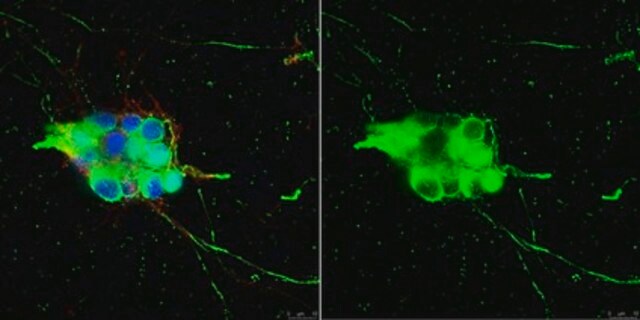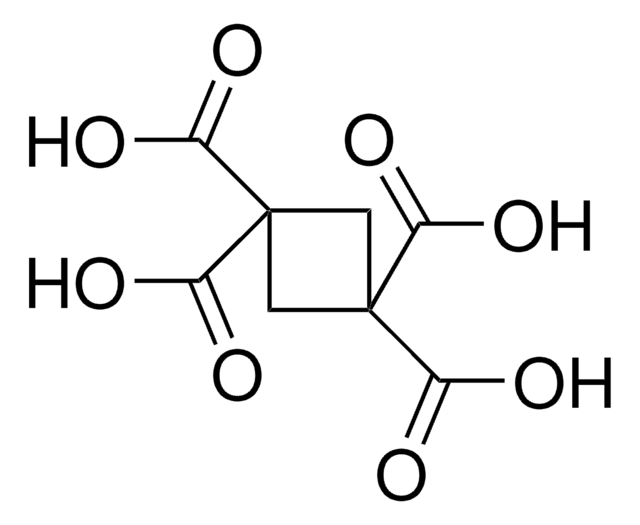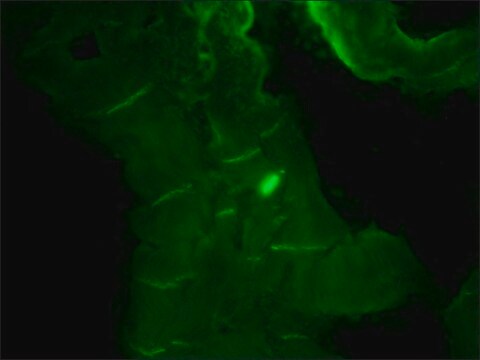AB2083
Anti-CD44v7 Antibody, exon v7
Chemicon®, from rabbit
Synonym(s):
Anti-CDW44, Anti-CSPG8, Anti-ECMR-III, Anti-HCELL, Anti-HUTCH-I, Anti-IN, Anti-LHR, Anti-MC56, Anti-MDU2, Anti-MDU3, Anti-MIC4, Anti-Pgp1
About This Item
Recommended Products
biological source
rabbit
Quality Level
antibody form
purified immunoglobulin
antibody product type
primary antibodies
clone
polyclonal
species reactivity
mouse, human, bovine, rabbit, rat, canine, pig
manufacturer/tradename
Chemicon®
technique(s)
ELISA: suitable
flow cytometry: suitable
immunocytochemistry: suitable
immunohistochemistry: suitable (paraffin)
immunoprecipitation (IP): suitable
western blot: suitable
NCBI accession no.
UniProt accession no.
shipped in
dry ice
target post-translational modification
unmodified
Gene Information
human ... CD44(960)
Specificity
Recent studies indicate that the expression of CD44 on the cell surface changes profoundly during tumor metastasis, particularly during the progression of various carcinomas. Sequencing analysis reveals that CD44 exists in different forms (at least 15 isoforms have been identified) that are variants of the common or standard hemopoietic form CD44s. Specifically, the human CD44 gene contains 19 exons, out of which 10 exons can potentially be alternatively spliced. In particular, CD44s contains exons 1-15 and exons 15-19. The other exons (e.g. 6-14) are also spliced in a variety of different cells. For example, epithelial cells contain exons 12-14 inserted into the CD44s transcripts. This isoform has been designated as CD44E. Other CD44 variants CD44v) have the same sequences at the two ends of the molecule, but differ in a middle region (with different numbers of additional exons) located on the external side of the cell membrane. It has been suggested that expression of CD44 variants with the additional exon 11 (so-called v7) is responsible for tumor progression and metastasis. In fact, CD44v7 expression has been used as an indicator of metastasis
Immunogen
Application
Flow Cytometry: 1:500-1:1,000
Immunofluorescence: 1:100-1:200
Immunohistostaining of paraffin embedded tissue: 1:150-1:250
Immunoprecipitation: 1:100-1:200
Western Blotting: 1:5,000-1:10,000
Optimal working dilutions must be determined by the end user.
Linkage
Physical form
Other Notes
Legal Information
Not finding the right product?
Try our Product Selector Tool.
Storage Class Code
10 - Combustible liquids
WGK
WGK 2
Flash Point(F)
Not applicable
Flash Point(C)
Not applicable
Certificates of Analysis (COA)
Search for Certificates of Analysis (COA) by entering the products Lot/Batch Number. Lot and Batch Numbers can be found on a product’s label following the words ‘Lot’ or ‘Batch’.
Already Own This Product?
Find documentation for the products that you have recently purchased in the Document Library.
Our team of scientists has experience in all areas of research including Life Science, Material Science, Chemical Synthesis, Chromatography, Analytical and many others.
Contact Technical Service







